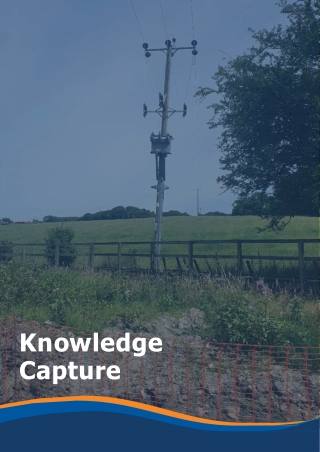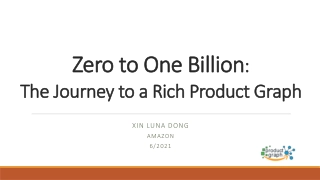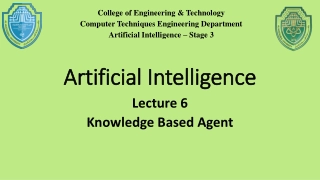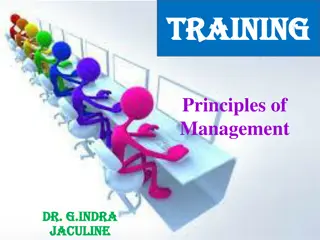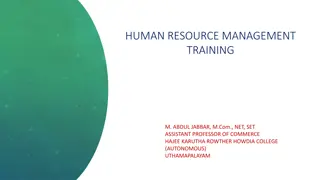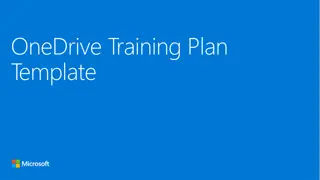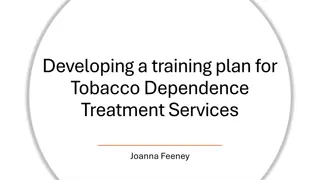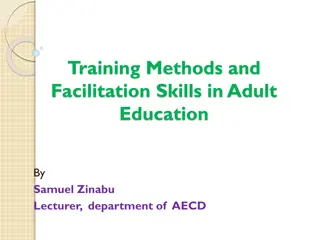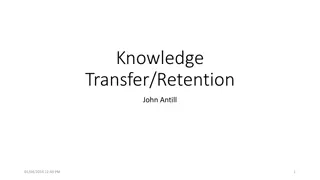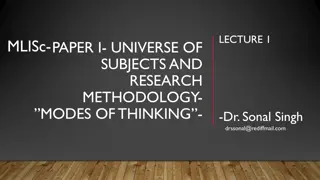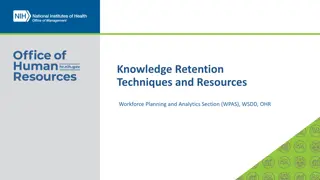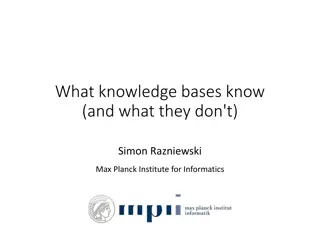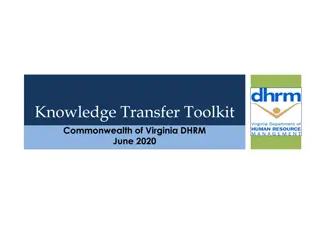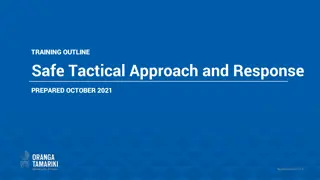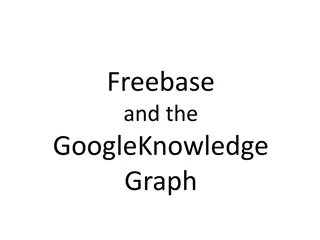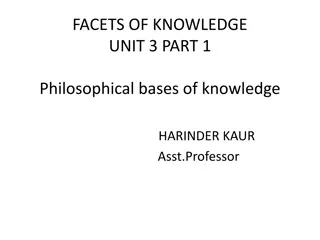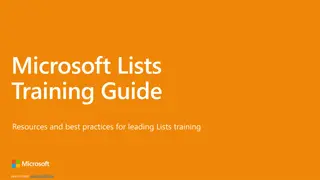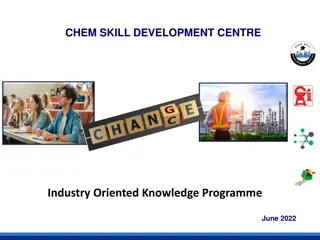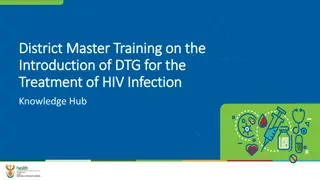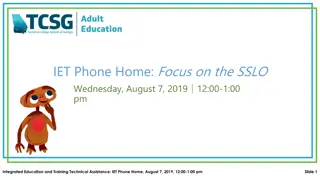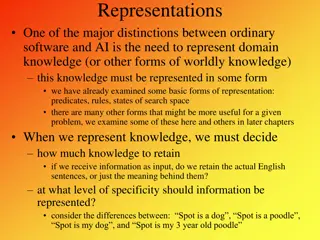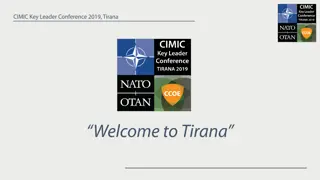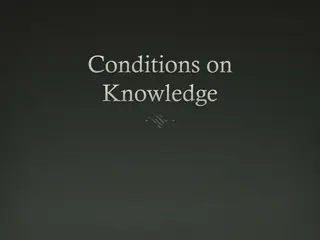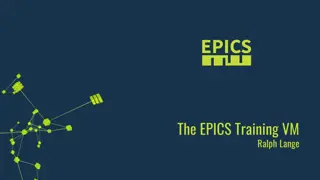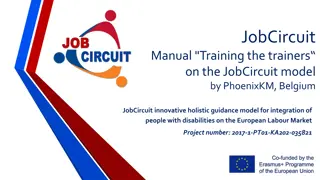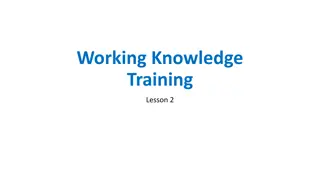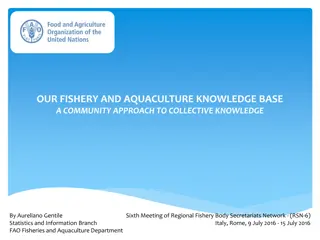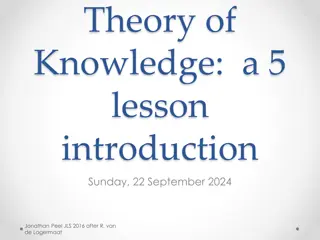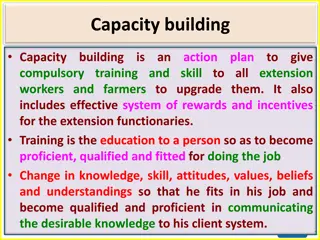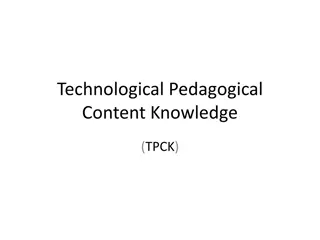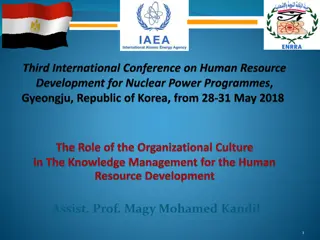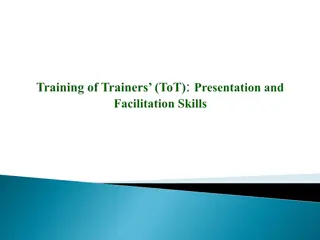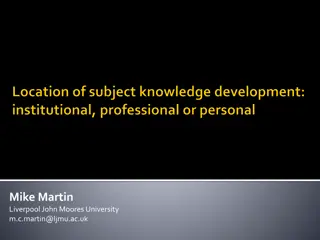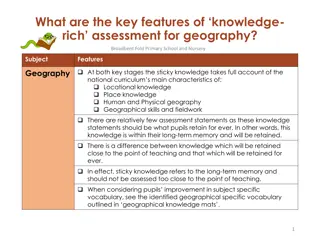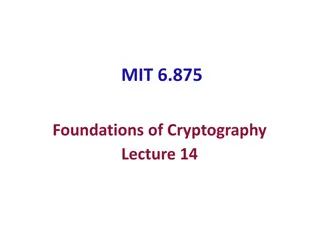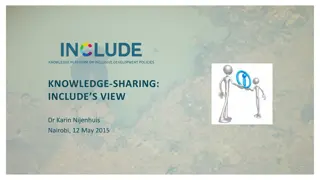Knowledge Capture
Knowledge capture is crucial for organizations to retain valuable expertise and prevent loss of critical knowledge due to employee turnover. Tacit and explicit knowledge play key roles, requiring strategic planning for retention, incentivizing knowledge-sharing culture, and implementing effective st
0 views • 6 slides
Exploring Product and Knowledge Graphs for Enhanced Information Retrieval
Dive into the world of product and knowledge graphs, uncovering the journey to a rich product graph, examples of knowledge graphs for songs, and the mission to provide comprehensive information on products and related knowledge. Discover use cases ranging from information provision to enhancing sear
3 views • 76 slides
Understanding Knowledge-Based Agents in Artificial Intelligence
Knowledge-Based Agents in AI utilize logic and knowledge representation to accept tasks, learn, and adapt to changing environments. Logic plays a crucial role in forming complex world representations and deriving actions based on inference. The central component is the Knowledge Base (KB), represent
4 views • 19 slides
Understanding Knowledge Management: Processes and Frameworks 2. In knowledge management, organizations create, share, and manage knowledge to enhance performance. It involves acquiring different types of knowledge through various means, such as perc
Knowledge Management, Organizational Objectives, Types of Knowledge, Tacit Knowledge, Explicit Knowledge
1 views • 17 slides
Pedagogical Shift in Physical Science: Constructing Knowledge Through Learner-Centered Experiences
There is a significant pedagogical shift in physical science education from viewing science as a fixed body of knowledge to emphasizing the process of constructing knowledge. Learners are now placed at the center stage, engaging in inquiry-based learning, critical thinking, and collaborative interac
3 views • 21 slides
Principles of Management Training: Meaning, Definition, Elements, Importance, and Methods
Principles of management training involve understanding the meaning and definition of training, its elements, importance, and various methods such as on-the-job and off-the-job training. Training is essential for employees to acquire knowledge, skills, and attitudes necessary for effective job perfo
0 views • 12 slides
Importance of Training and Development in Human Resource Management
Training is defined as the act of enhancing employee knowledge and skills for specific job roles. Human Resource Management focuses on planning, acquiring, training, and developing individuals to achieve organizational objectives. Training is crucial for organizational success, enhancing employee pe
2 views • 16 slides
Comprehensive OneDrive Training Plan Template
This comprehensive training plan template outlines the training approach, target audiences, key scenarios, preferred learning methods, and training resources for effectively utilizing OneDrive. It covers audiences such as executives, admin changemakers, knowledge workers, and mobile employees, with
0 views • 14 slides
Comprehensive Training Plan for Tobacco Dependence Treatment Services
Developing a structured training plan is crucial for enhancing the knowledge, skills, and competencies of healthcare professionals in tobacco dependence treatment. This plan facilitates improved patient care, staff satisfaction, and compliance with standards, leading to better clinical outcomes and
0 views • 8 slides
Understanding Training Methods and Facilitation Skills in Adult Education
Explore the distinctions between formal and non-formal education, as well as the differences between education and training in the context of adult learning. Discover how training prepares individuals for specific tasks, while education focuses on theoretical knowledge and skill development. Gain in
1 views • 146 slides
Importance of Knowledge Retention in Organizations
Organizations face negative impacts on performance due to the loss of knowledge. Strategies such as exit interviews, mentorship, and knowledge sharing tools are vital for effective knowledge retention. Assessing knowledge retention maturity through various techniques is crucial, aligning with ISO st
0 views • 11 slides
Understanding Modes of Thinking and Knowledge Development
Man's acquisition of knowledge is intricately linked to his ability to think, reason, and perceive. Knowledge is a result of experiences gained through perception, intellect, and intuition. The history of humanity is a story of knowledge acquisition and development, with man at the forefront as the
1 views • 18 slides
Effective Knowledge Retention Strategies in Workforce Planning and Analytics
Retaining knowledge is crucial for organizations to enhance customer service, foster innovation, improve efficiency, and bridge skill gaps. This article explores the significance of knowledge retention, the types of knowledge essential for succession planning, and two effective strategies - the Know
1 views • 10 slides
Exploring Knowledge Base Construction and Commonsense Knowledge in Fiction
Delve into innovative research interests focusing on knowledge base construction using fictional texts as archetypes, taxonomies for constructing knowledge bases, and extraction of commonsense knowledge from diverse sources. Challenges such as sparsity and semantics are addressed through comprehensi
3 views • 48 slides
Knowledge Transfer Toolkit for Organizational Success
This toolkit, developed by the Commonwealth of Virginia DHRM in June 2020, covers the essentials of knowledge transfer, including its definition, impact, challenges, and management strategies. It emphasizes aligning knowledge transfer with strategic goals, overcoming barriers through leadership supp
2 views • 15 slides
Safe Tactical Approach and Response Training Outline
This training outline provides an overview of the structure, key topic areas, frameworks, and values of the Safe Tactical Approach and Response (STAR) training. It outlines the learning journey across five days, including theoretical training, defensive tactics, participant roleplays, and assessment
0 views • 10 slides
Evolution of Freebase and the Google Knowledge Graph
Freebase was initially created in 2005 as an open shared database of knowledge, later acquired by Google and absorbed into the Google Knowledge Graph. Its approach included crowdsourcing updates and additions, focusing on data rather than text. The schema of Freebase included around 1500 types, 3500
1 views • 12 slides
Facets of Knowledge: Exploring Philosophical Bases and Types
Delve into the philosophical foundations and types of knowledge with insights on local and universal knowledge, theoretical and practical aspects, and school versus out-of-school knowledge. Understand how facets contribute to extended knowledge about attributes within different frames.
0 views • 10 slides
Comprehensive Microsoft Lists Training Guide
Explore resources, best practices, and training methods for leading Microsoft Lists training sessions. Understand the training approach, key audiences, scenarios, and preferred learning methods. Get insights on engaging managers, admins, change champions, knowledge workers, and mobile workers. Enhan
0 views • 13 slides
Industry-Oriented Knowledge Programme by CHEM.SKILL.DEVELOPMENT.CENTRE June 2022
CHEM.SKILL.DEVELOPMENT.CENTRE (CSDC) offers an industry-oriented knowledge programme to bridge the gap between theory and practice. The objectives include enhancing employability, providing practical knowledge, building confidence, and understanding industry practices. The programme's strategy invol
0 views • 14 slides
Comprehensive District Master Training for DTG in HIV Treatment Knowledge Hub
Under this program, District Master Training on the Introduction of DTG for HIV Infection Treatment is provided, supported by the Knowledge Hub. The initiative offers training materials, guidelines, and videos, accessible through the Knowledge Hub platform. Participants can register through SkillSMA
0 views • 8 slides
Integrated Education & Training Technical Assistance: Building Effective Training Objectives
In this session, the focus is on creating a single set of learning objectives for an Integrated Education & Training program. The importance of measurable training objectives and their role in achieving program goals are discussed. Tips are shared on enhancing training effectiveness, emphasizing wor
0 views • 23 slides
Understanding Knowledge Representation in Artificial Intelligence
In AI, representing domain knowledge is crucial and comes in various forms like predicates, rules, and search space states. Deciding the level of specificity and form of representation is key. Knowledge can be categorized into procedural, domain, and common sense knowledge, available in forms such a
2 views • 32 slides
Ensuring Effective NATO CIMIC Training and Education Coordination
This document outlines strategic military training and education objectives, focusing on NATO CIMIC personnel and assets' readiness for contributing to comprehensive approach operations. Key goals include policy training, CIMIC assessment capability, NATO/EU cooperation, and joint training coordinat
0 views • 5 slides
Exploring Epistemology: Understanding Knowledge and Truth
Epistemology delves into the nature of knowledge, understanding, wisdom, and justification, questioning the extent of human knowledge and the different kinds of knowledge. It explores skepticism and conditions on propositional knowledge, discussing whether knowledge implies truth and the debate betw
1 views • 54 slides
EPICS Training VM - Hands-On Training Setup Using Ansible Automation
Hands-on training setup using the EPICS Training VM, a reproducible platform based on Oracle VirtualBox. The VM simplifies installations with Ansible automation, allowing trainees to start quickly with pre-configured environments. The platform supports various host operating systems and provides mod
0 views • 8 slides
Effective Training Manual for Integrating People with Disabilities into the European Labour Market
This comprehensive training manual provides guidance for trainers on implementing the innovative JobCircuit model by PhoenixKM, Belgium. It covers didactic guidance, planning and preparing training sessions, facilitating engaging training environments, and evaluating training impact. The manual outl
0 views • 20 slides
Navigating the World of Big Data, Knowledge, and Crowdsourcing
The world has evolved into a data-centric landscape where managing massive amounts of data requires the convergence of big data, big knowledge, and big crowd technologies. This transformation necessitates the utilization of domain knowledge, building knowledge bases, and integrating human input thro
1 views • 5 slides
Step-by-Step Guide to Setting up Different Types of Outputs in Knowledge Training Lesson 2
Learn how to add a cell phone, email address, phone number, pager, and radio channel in Working Knowledge Training Lesson 2. Explore setting up and editing routes of escalations for efficient communication. Understand the configuration, properties, availability options, and saving procedures for eac
0 views • 20 slides
Enhancing Fisheries and Aquaculture Knowledge for Sustainable Development
The Fishery and Aquaculture Knowledge Base, presented at the Sixth Meeting of Regional Fishery Body Secretariats Network, focuses on collective knowledge exchange in the fisheries and aquaculture sector. This knowledge hub offers a wealth of information on various aspects, supporting Sustainable Dev
0 views • 13 slides
Exploring the Nature of Knowledge in Theory of Knowledge
Delve into the essence of knowledge with Jonathan Peel's introduction to Theory of Knowledge, pondering on how different disciplines perceive knowledge, the impact of empirical questioning, and timeless wisdom on ignorance and progress. Explore the concept of basic knowledge and its implications, in
0 views • 37 slides
Capacity Building and Training for Extension Workers and Farmers
Capacity building involves compulsory training and skills development for extension workers and farmers, along with effective reward systems. Training is essential for individuals to acquire new skills and knowledge, fitting them for their roles. The process includes developing competencies required
0 views • 18 slides
Understanding Modelling Knowledge and Knowledge Representation
Explore the significance of modelling knowledge through knowledge representation, making it explicit, independent, and reusable. Learn why knowledge representation is essential and how it facilitates exchange, query, inference, and visualization. Delve into examples of knowledge application in vario
0 views • 30 slides
Understanding Technological Pedagogical Content Knowledge (TPCK)
Technological Pedagogical Content Knowledge (TPCK) is a framework developed by Punya Mishra and Matthew J. Koehler that integrates content, pedagogy, and technology for effective teaching. TPCK emphasizes the interaction between these three key components to enhance technology integration in educati
0 views • 55 slides
Enhancing Human Resource Development through Knowledge Management
Monitoring and improving human performance in nuclear facilities is a key challenge, with knowledge management playing a crucial role in increasing staff competence. Organizational culture influences knowledge-sharing success. Explore the components of knowledge management, its importance in nuclear
0 views • 17 slides
Effective Training Delivery: Key Considerations and Strategies
Effective training delivery requires understanding learning styles, adult learning principles, presentation skills, group interaction, audience needs, evaluation methods, and train-the-trainer techniques. Training should involve unlearning old knowledge, relearning new information, and engaging part
0 views • 29 slides
Understanding Subject Knowledge Development in Education
Exploring the complexities of subject knowledge development in education, this study delves into areas such as students' existing knowledge, competencies, and the role of institutions in shaping knowledge acquisition. The focus lies on personalizing knowledge to individual needs rather than a fixed
1 views • 22 slides
Key Features of Knowledge-Rich Assessment in Geography at Broadbent Fold Primary School
Broadbent Fold Primary School emphasizes sticky knowledge in geography assessment focusing on locational knowledge, place knowledge, human and physical geography, and geographical skills. Assessment statements aim to facilitate long-term retention of knowledge, vocabulary acquisition, and fieldwork
0 views • 8 slides
Zero-Knowledge Proofs in Cryptography
Exploring zero-knowledge proofs in cryptography, this content delves into interactive protocols, perfect zero-knowledge definitions, and the QR protocol's honest verifier and malicious verifier zero-knowledge theorems. It discusses how simulators work to maintain zero-knowledge properties and the si
0 views • 37 slides
Knowledge Sharing and Inclusive Development Policies
Knowledge Platform on Inclusive Development Policies (INCLUDE) focuses on enhancing research utilization in policy-making to foster more inclusive development. It was established in 2012 with the aim of bridging the gap between research and policy processes in African countries. INCLUDE engages expe
0 views • 8 slides
